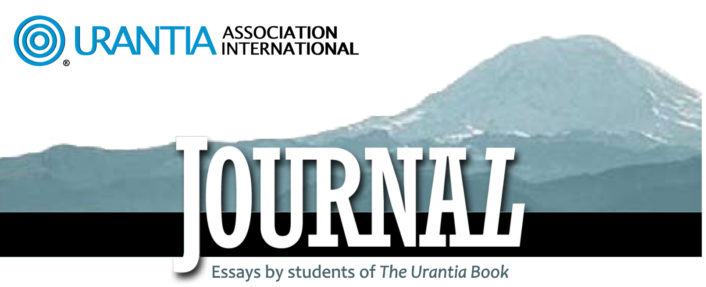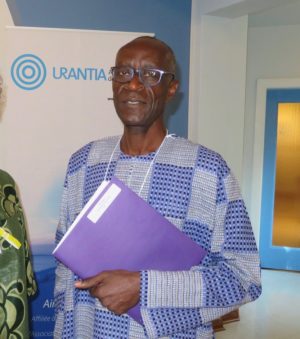© 2019 Suzanne Kelly, Agnes Lazar, Gaétan Charland, Moustapha N’diaye
© 2019 International Urantia Association (IUA)

(Note: To print a hard copy of this Journal click the “Print Version” button above. After the print version appears, right-click into any white space and choose “Print.”)
¶ In This Issue
- Journal Editorial November 2019 – Suzanne Kelly, USA
- The Study Group – Agnes Lazar, Belgium
- Study Groups Revisited – Gaétan Charland, Canada
- What Does the Future Hold for Study Groups? – Moustapha N’diaye, Sénégal
- Dynamic and Living Peace – Moustapha K. Ndiaye, Sénégal
- About the Journal
¶ Journal Editorial November 2019
Suzanne Kelly, USA
Greetings Fellow Urantia Book Readers,

The second production of the Urantia Association’s Journal for 2019 highlights articles and presentations about study groups and how they are viewed by readers around the world. We have an overview of “The Study Group,” by Agnes Lazar, Belgium_,_ “Study Groups Revisited” by Gaétan Charland, Canada, and both “Dynamic and Living Peace” and “Study Groups” by Moustapha N’diaye, Senegal. Each one is a vibrant understanding of what is needed to motivate and guide students of The Urantia Book to a greater comprehension of the teachings within this galactic reservoir of cosmic knowledge.
¶ The Study Group
Agnes Lazar, Belgium

In this article, I wish to share some reflections that have been long maturing, the result of which are experiences in the bosom of different study groups, including one I initiated 16 years ago.
In January 2001, arising from various personal ordeals, I found myself in great confusion. Turning to God, I prayed to be led to discover a deeper sense of the notion of love as well as a clearer path in life in the years to come. The response was not slow. In September of the same year, I found myself in a group of long-term readers of The Urantia Book. We were all in the presence of an educator who, very simply, spoke of mankind as a creature of God, carrying on an eternal project of progression and growth, to which one could join without delay and in an active way.
This instructor aroused in me a profound desire to do as he did: to consecrate my life to developing and affirming my relationship with God, to make him known around me, and to start a serious study of the fifth revelation.
¶ Study Groups Revisited
Gaétan Charland, Canada

During the conference in Amsterdam, I met with a long-time reader and had an interesting discussion with him about the name, nature, function, mission, and goals of study groups. Since then I had a few more discussions about this subject with readers from Europe, North America, Africa, and my local association. In all those exchanges, my goal was to explore what can be done to make study groups more appealing, practical, and useful to the readers and students of both the new and the old generations.
Looking at the directives expressed by the revelators in the Publication Mandate to create thousands of study groups, to train leaders and teachers, and to respond to the challenge to accomplish the mission of The Urantia Book as stated in the Foreword: to expand cosmic consciousness and enhance spiritual perception [UB 0:0.2]—and to answer the other great challenge, to achieve better communication with the divine Monitor that dwells within the human mind [UB 196:3.34], my questions are: Are the study groups fulfilling these goals? Or are study groups organized and facilitated without having any of these specific goals?
From these exchanges, I realized that study groups need to be revisited if they are to accomplish what the revelators possibly had in mind for them. Perhaps doing study groups for so many years and becoming somewhat complacent about them, we may gradually forget about their true purpose and importance while making them more intellectual and social instead of more spiritually progressive and attractive to a new generation of readers.
¶ What Does the Future Hold for Study Groups?
Moustapha N’diaye, Sénégal

In the mid-1970s, guided by our spiritual mentor, a number of like-minded friends and I entered into a new journey of spiritual awakening based on the revelations of The Urantia Book. Our mentor, who had received his copy of the “Urantia Cosmology” directly from a French reader in the 1960s, tailored the guidance he offered us to the sociological reality of Senegal at the time. In the year 2000, some twenty-five years later, we discovered and began working with several other study groups worldwide.
Two years earlier, in December of 1998, we spoke by telephone with a Trustee of Urantia Foundation. A Fellowship member had contacted the Trustee around that same time in an effort to find a local Dakar contact to assist with his Fellowship mission to Africa. He had planned a short stopover in Dakar, along with his companion to pick up a shipment of English copies of The Urantia Book that had just arrived from the Port of Marseille. These books were destined for distribution throughout English-speaking African countries (Senegal is French-speaking) and, together, they had planned to crisscross Africa to carry out their mission.
¶ Dynamic and Living Peace
Moustapha K. Ndiaye, Sénégal
And the peace of God, which transcends all understanding, will guard your hearts and your minds in Christ Jesus. [Philippians 4:7]
O bestow on your people Israel great peace forever, for you are King and the Lord of all peace. … Blessed are you, Yahweh, who blesses his people Israel with peace. [UB 150:8.7]
Peace be unto you. And unto you, peace.

Introduction
Who among us has paused to reflect upon the familiar greeting and response, “Peace be unto you. And unto you, peace?” This essay draws on personal experience and understandings, the testimonials from those who collaborated in its writing, and an assessment of the religious literature of the Far East (particularly the writings of Hinduism, Taoism, and Buddhism), to do just that—pause and reflect on a dynamic and living peace. In so doing, this reflection explicitly relies on the teachings of The Urantia Book and the example provided by the life of Jesus as recounted in Part IV.
We have two goals. The first is to determine the extent to which human and superhuman agents contributed to this much desired peace, despite the unexpected consequences arising from the vicissitudes of our planetary history. And the second, to understand how our experience with the teachings of The Urantia Book reveal the myriad problems of the modern world, the relationship of those problems to a lack of dynamic and living peace, and the practical contributions this revelation can offer for their resolution.
Our immediate observation from this reflection identifies a deep-rooted malaise that characterizes modern times. This malaise, which we refer to as “stress,” has multiple and often unsuspected sources. It results from the external conflicts and internal disturbances that increasingly pervade both our individual lives and society at large. Globalization and the interweaving of economic, cultural, political, religious, and social institutions makes this malaise one the most widely shared perils confronting us today.
¶ About the Journal

The Journal is produced twice yearly and contains essays, articles and study aids by readers and for readers of The Urantia Book. Any interpretations, opinions, conclusions, or artistic representations, whether stated or implied, are those of the authors and do not necessarily represent the views and opinions of Urantia Association International, the National or Local Urantia Associations, or the editorial team of the Association’s Journal.
You can view the entire collection of issues in the archives. All issues before 2017 are downloadable PDF format.
The Journal is currently published in English, French and Spanish. (There are some older issues that were published in Finnish.) You can view the French and Spanish Journals by clicking on the language choices in the pull down menu at the top of the page.
- Subscriptions
- Journal Team
- Submission Policy
- Citation Guidelines